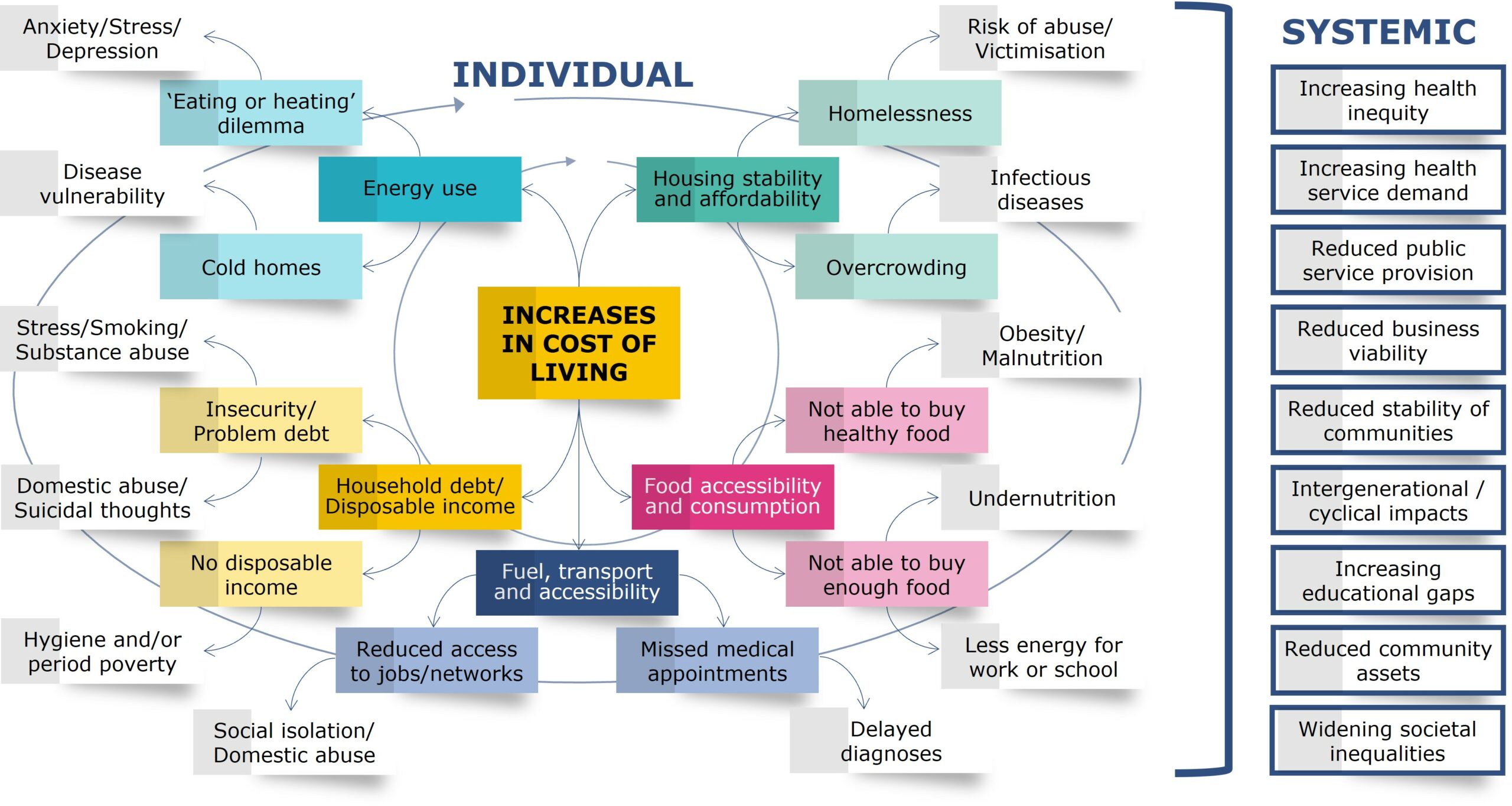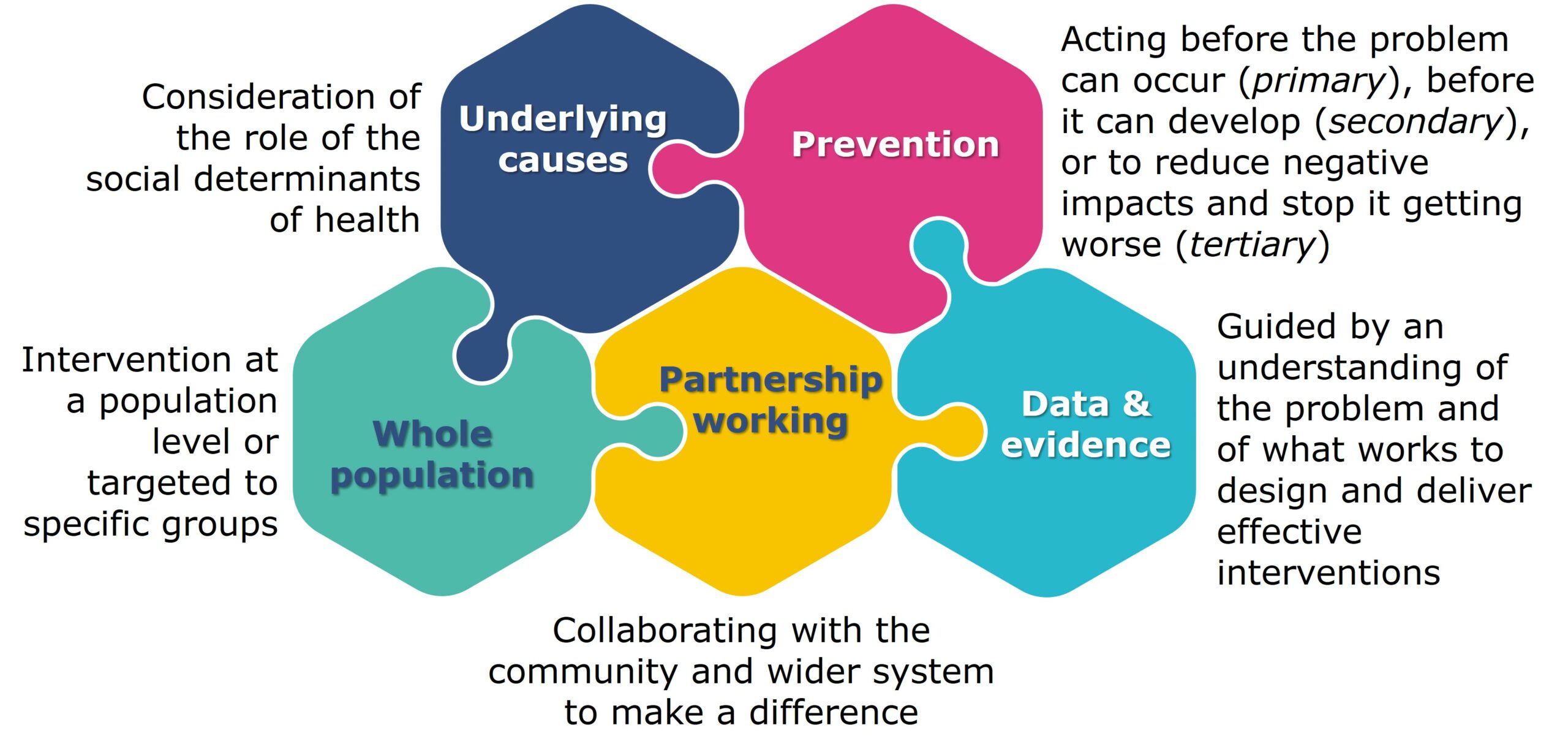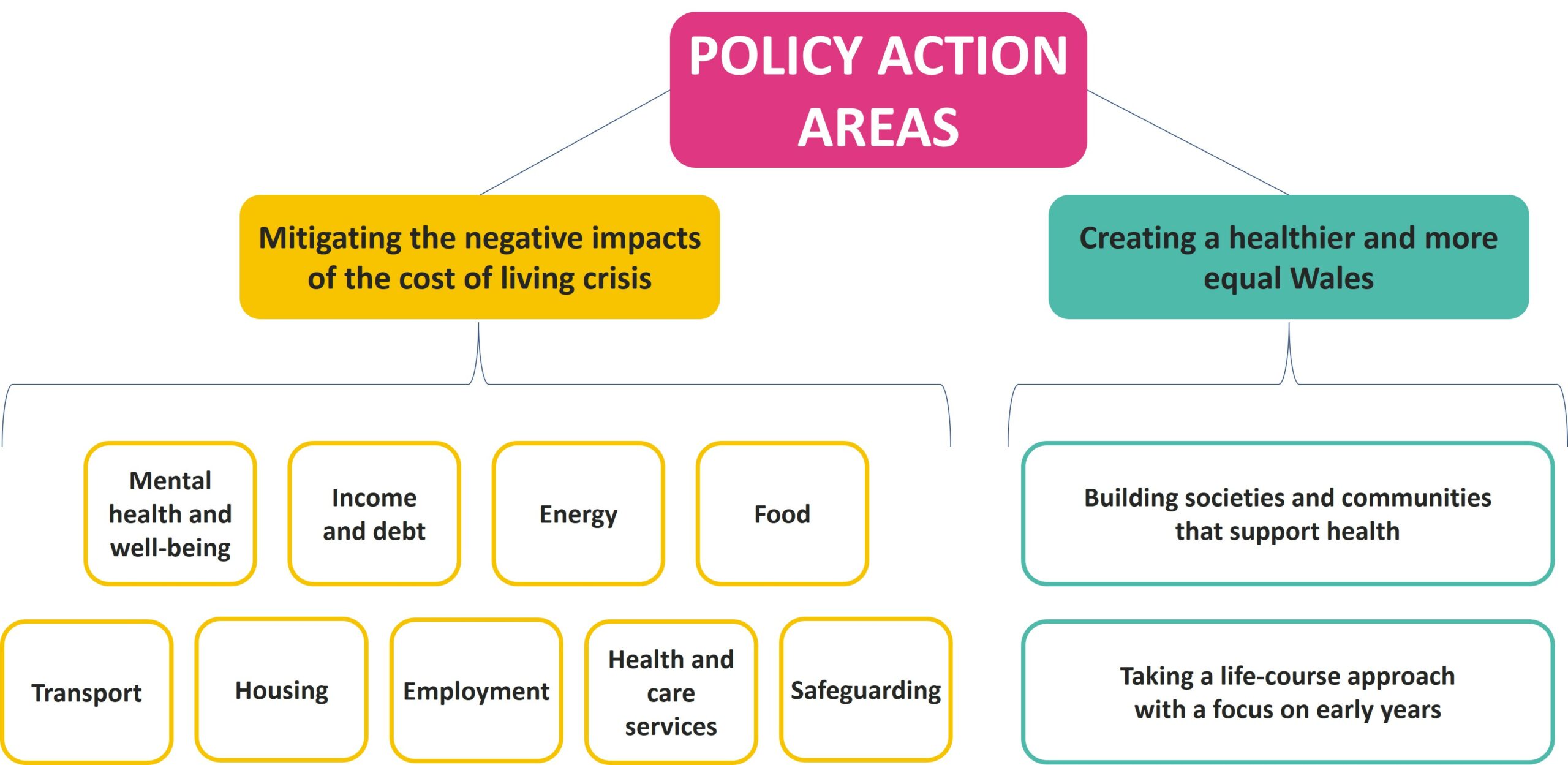The rising cost of living is a public health emergency. Public Health Wales has been looking into what a system-wide response could look like.
Why is the cost of living crisis a public health issue?
Having a warm, dry place to live, nutritious food, and fair work are fundamental building blocks for living a healthy life. Not being able to afford the essentials, such as food, rent, heating or transport, has wide-ranging negative impacts on mental and physical health and wellbeing (Figure 1).
For example, the rising cost of food means many people in Wales are unable to feed themselves or their families enough food, let alone nutritious, healthy food. A good diet is essential for good health in the short and longer-term, as obesity is a major risk factor for conditions like diabetes and cancer.
Energy costs have also increased, which means many households are having to cut back on buying food or heating their homes. We know that living in damp and cold homes has many negative impacts on health, including an increased risk of heart attacks and stroke, as well as arthritic and respiratory conditions. Making such difficult decisions on how to spend limited household budgets also takes its toll on mental health.
The risk that the cost of living crisis poses to people’s mental health is an overriding and pressing concern, with poor mental health closely linked to poverty and low incomes.
These health and wellbeing impacts are compounded by a system that is struggling to respond to growing needs, while businesses, charities, and public services are also battling increased costs. This comes in the aftermath of the COVID-19 pandemic, which put unprecedented demand on health and social care services.
The totality of impacts on health and well-being has the potential to put the cost of living crisis on a par with the COVID-19 pandemic.

Source: Public Health Wales (2022)
What does a public health response look like?
In Public Health Wales’ report we make the case that the cost of living crisis requires an urgent public health response (Figure 2).
The response should do two things: mitigate the negative effects of the immediate crisis across a number of policy areas, and tackle the underlying causes of health inequalities to create a healthier and more equal Wales in the long-term.

Source: Public Health Wales (2022), adapted from Christmas and Srivastava (2019).
This means putting health and well-being considerations at the heart of all policy making that affects the building blocks for a healthy life, such as employment, education, the economy, housing, planning, and the environment. This should come with a particular focus on ensuring every child has the best start in life (Figure 3).

Source: Public Health Wales (2022)
Short-term benefits from immediate action
Immediate action is needed across a breadth of areas to mitigate health harms, focusing on those hardest hit. This needs to focus on higher fuel and food prices and stretched public services, particularly over the winter months. Examples include identifying and targeting support to those living in cold homes, and supporting local initiatives that help people to stay warm and eat well.
The risk that the cost of living crisis poses to people’s mental health is an overriding and pressing concern, with poor mental health closely linked to poverty and low incomes. Mechanisms for maximising income, particularly for those with the lowest incomes, will improve mental and physical health by reducing financial strain and making essential goods more affordable. These could include campaigns to raise awareness of the support available, or joint working between services (such as health and care and advice services) to help to deliver targeted support to those who are most at risk of financial strain.
Medium to longer-term benefits from immediate action
The cost of living crisis can and should also serve to mobilise action now in areas that will benefit population health and well-being in the longer-term.
The totality of impacts on health and well-being has the potential to put the cost of living crisis on a par with the COVID-19 pandemic.
A key example is investing in warm homes: evidence shows that every £1 spent on improving warmth in vulnerable households results in £4 of health benefits. Other examples include improving housing availability, affordability and quality in order to reduce the risks of living in unsafe properties or of homelessness.
Additionally, making it easier for people to access screening and vaccination services with sustainable travel options has dual benefits for preventing future health issues as well as tackling climate change and its impacts on health. Promoting fair work where workers are “fairly rewarded, heard and represented, secure and able to progress in a healthy, inclusive environment where rights are respected” can help reduce the number of working people living in poverty or on precarious incomes.
Creating a healthier, more equal Wales
The negative impacts of the cost of living crisis – and the COVID-19 pandemic before that – are so significant because they push on the existing vulnerabilities of poverty and inequality. Therefore, any public health response must also tackle these underlying causes so that health and well-being are improved for all.
Harnessing the renewed focus on health inequalities has the potential to reap vital benefits in the longer-term as well as in the current crisis. Making progress involves thinking and planning for the long-term and translating the evidence on tackling health inequalities into practice.
Investing in health and well-being
Investment (or divestment) in any one of these key building blocks has impacts across other areas. Macroeconomic challenges such as the cost of living crisis will impact all living and working conditions. There is considerable evidence demonstrating that it is financially preferable for systems to prevent, rather than treat, ill-health. A 2016 systematic review of the return on investment of public health interventions demonstrated that on average for every £1 invested in public health, £14 is returned to health services or the wider system.
Policies to guide our response
The unique policy context of Wales provides an enabling environment for public bodies to act on the underlying causes of poor health and well-being in their immediate response to the cost of living crisis and when looking longer-term.
We are fortunate to have the Well-being of Future Generations (Wales) Act 2015, which provides a clear mechanism for achieving these policy objectives. Wales’ second Future Generations Commissioner, due to begin his tenure shortly, is arguably starting in a role that is needed even more now, than when the legislation was first passed into law. While the cost of living crisis presents a challenging backdrop, it also creates an opportunity for us to collectively refocus our efforts on tackling the underlying causes of poor health and well-being in Wales. Enabling legislation, like the Well-being of Future Generations Act, and the proactive support of the Commissioner are vital mechanisms for achieving this. Progress towards each of the seven well-being goals is interlinked with progress on improving the building blocks for a healthy life that underpin health inequalities.
The Socio-economic Duty and Public Health (Wales) Act 2017 also requires the Welsh Government and public sector to make decisions that prioritise well-being.
The current cost of living crisis can and must provide the catalyst to accelerate progress on making Wales a healthier and more equal place to live. Grasping this opportunity will not only improve population health and well-being but will also put us on a more secure footing for the public health challenges that will lie ahead.
All articles published on the welsh agenda are subject to IWA’s disclaimer





